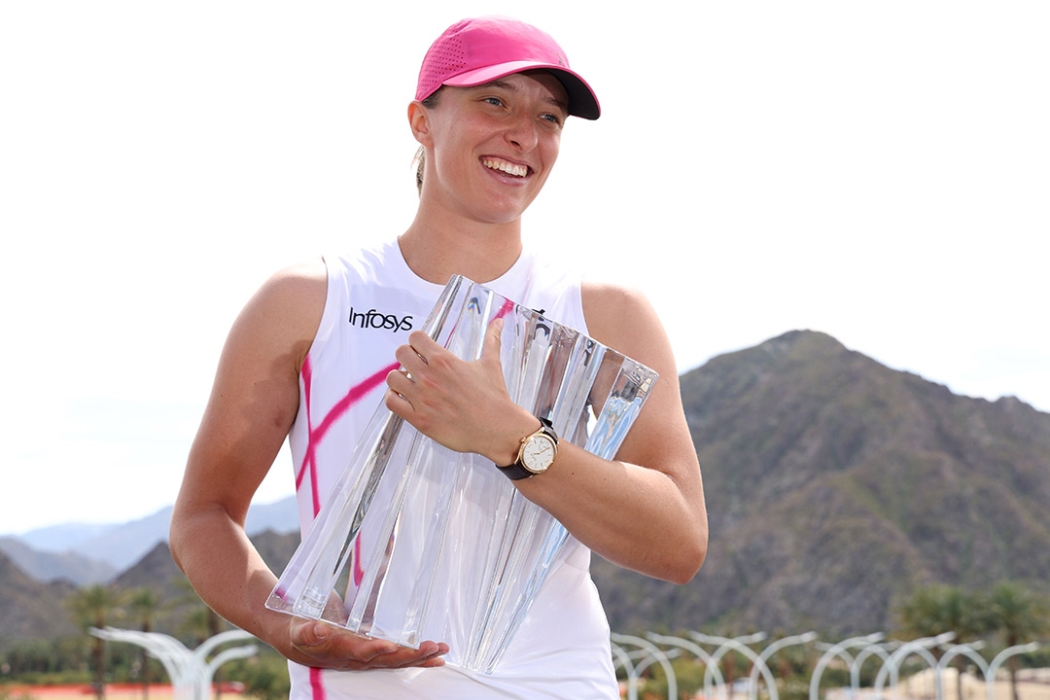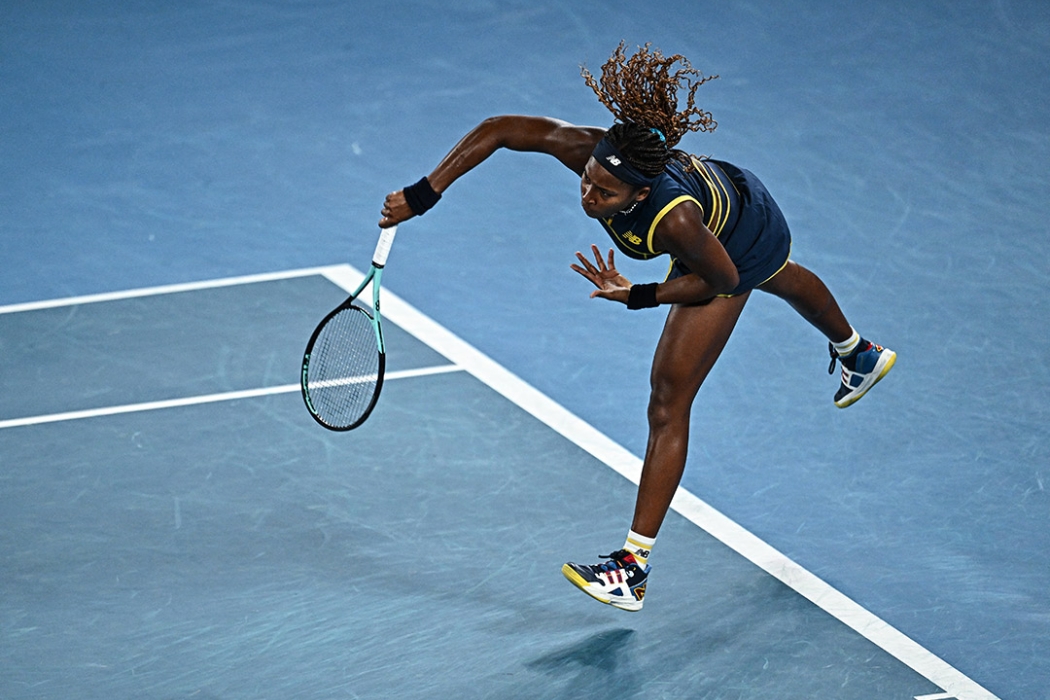It’s staggering that, three times since 2008, the game’s dominant woman has exited the sport while still a reigning Grand Slam champion and world No.1. It’s something that has never happened in men’s tennis.
When top-ranked Justine Henin retired in May 2008 as the most recent Roland Garros winner, competitive chaos ensued. The No.1 ranking changed hands 11 times in the next 18 months, handballed between five different players.
It was a similar story in April 2017, when reigning Australian Open champion Serena Williams – who returned to world No.1 after her victory at Melbourne Park – announced she was pregnant and shut down her season. She did not play competitively for almost 14 months.
In her absence, things again became unpredictable. The next seven Grand Slam tournaments were won by seven different players, and four of them – Jelena Ostapenko, Sloane Stephens, Caroline Wozniacki and Simona Halep – were first-time major winners. The No.1 ranking changed hands six times within 12 months of Williams’ announcement.
In March 2022, reigning Australian Open champion and world No.1 Ash Barty announced her retirement.
But since Barty’s departure, it has been a story of consistency, rather than chaos.
The current top five – Iga Swiatek, Aryna Sabalenka, Coco Gauff, Elena Rybakina and Jessica Pegula – have separated themselves from the rest of the women’s field. Their results in the past three seasons have introduced an era of sustained success not seen at the top of women’s tennis for more than a decade.

Swiatek’s crushing grip on the No.1 ranking sees her approaching 100 weeks at the top. Her winning streaks and success against top-10 rivals, plus three major titles since the beginning of 2022, have recalled all-time greats.
Sabalenka’s extraordinary success at the Slams – six consecutive semifinals and counting – is something nobody has achieved since Williams’ Grand Slam dominance.
Rybakina and Pegula have produced outstandingly consistent results at Grand Slam and WTA 1000 level. Between them, they have notched 28 quarterfinals (or better) at these “big” tournaments since the start of 2022.
Gauff, meanwhile, has built on her 2022 Roland Garros final to become the sport’s newest Grand Slam women’s champion.
THE WTA TOP FIVE
These women have simultaneously ranked inside the top five for more than seven months, dating back to when Gauff won the 2023 US Open.
Fifth-ranked Pegula is not playing this week, but the top four have all progressed to the Stuttgart quarterfinals, on track for a sweep of the semifinal slots.
Across a variety of metrics, Swiatek, Sabalenka, Gauff, Rybakina and Pegula have elevated themselves above the rest.
Here’s how.
(Numbers don’t include Billie Jean King Cup participation, and are compiled up until the end of the Charleston/Bogota week.)
Total match wins
Since the beginning of 2022, the top five are the only women to have notched 100+ match wins at tour level.
155 - Iga Swiatek
110 - Jessica Pegula
106 - Coco Gauff
104 - Elena Rybakina
102 - Aryna Sabalenka
96 - Daria Kasatkina
93 - Maria Sakkari
90 - Caroline Garcia
85 - Ons Jabeur
85 - Jelena Ostapenko
Winning percentage
The top five women are also the only players on the WTA Tour to attain a winning percentage of 70 or higher since the beginning of 2022.
87.08% - Iga Swiatek
72.73% - Elena Rybakina
71.83% - Aryna Sabalenka
71.43% - Jessica Pegula
71.14% - Coco Gauff
68.00% - Ons Jabeur
67.69% - Karolina Muchova
65.33% - Marketa Vondrousova
64.39% - Jelena Ostapenko
64.08% - Madison Keys
“Big Tournament” quarterfinals
Considering the Grand Slams and WTA 1000 events as one tournament category, the top five women have excelled, reaching at least the quarterfinal stage at more of these events than any other players.
Interestingly, of the 19 times Swiatek reached the quarterfinal stage, she went on to win 10 of these tournaments.
Sabalenka, too, progressed beyond the quarterfinals the majority of times she reached that stage, notching six semifinals, two finals and three tournament wins.
19 - Iga Swiatek
15 - Aryna Sabalenka
15 - Coco Gauff
15 - Jessica Pegula
13 - Elena Rybakina
10 - Maria Sakkari
8 - Ons Jabeur
6 - Madison Keys
Titles
This is the metric by which Swiatek’s dominance becomes clearest. Fifth-ranked Pegula sits just outside this leaderboard, with three WTA titles since the beginning of 2022.
16 - Iga Swiatek
5 - Elena Rybakina
5 - Coco Gauff
4 - Aryna Sabalenka
4 - Ons Jabeur
4 - Jelena Ostapenko
4 - Barbora Krejcikova
4 - Caroline Garcia
Finals
They’ve occasionally been referred to as the WTA’s potential version of the Big Three, and here, Swiatek, Sabalenka and Rybakina have elevated themselves above the rest.
Gauff sits just outside this leaderboard, with six finals – winning the past five.
19 - Iga Swiatek
11 - Aryna Sabalenka
11 - Elena Rybakina
9 - Ons Jabeur
7 - Jessica Pegula
7 - Maria Sakkari
7 - Daria Kasatkina
7 - Barbora Krejcikova
Grand Slam titles
Since the beginning of 2022, top two Swiatek and Sabalenka have combined to win more than half the major titles on offer. They are also the first two women to defend a Grand Slam singles title since Serena in 2016.
3 - Iga Swiatek
2 - Aryna Sabalenka
1 - Coco Gauff
1 - Elena Rybakina
1 - Marketa Vondrousova
1 - Ash Barty*
Grand Slam finals
In previous eras, certain players may have peaked at the Grand Slams while others flourished at week-in, week-out WTA events.
Here we see that the current top four are replicating their consistent success at WTA events on the Grand Slam stage. And while she is yet to reach a Grand Slam final, Pegula has, impressively, appeared in the quarterfinals at five of the past nine majors dating back to the start of 2022.
3 - Iga Swiatek
3 - Aryna Sabalenka
3 - Ons Jabeur
2 - Coco Gauff
2 - Elena Rybakina
1 - Marketa Vondrousova
1 - Ash Barty*
1 - Zheng Qinwen
1 - Karolina Muchova
1 - Danielle Collins
*Barty is no longer active, after announcing her retirement in March 2022

